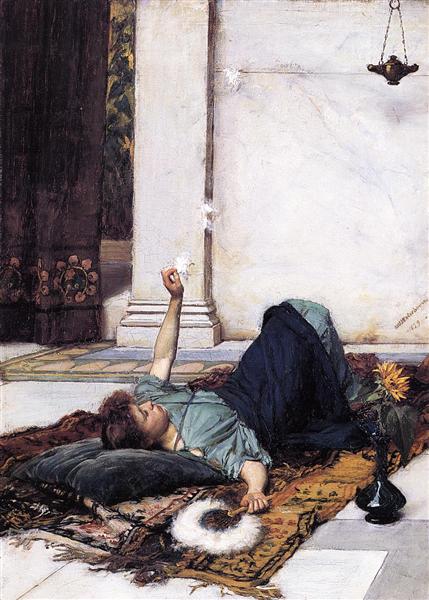Description
John William Waterhouse's 1879 painting It Is Sweet to Do Nothing encapsulates the aesthetically captivating essence of the Pre-Raphaelite movement, which seeks to evoke romantic beauty and deep symbolism from nature and mythology. A leading representative of this movement, Waterhouse achieves a unique union between aesthetic sensitivity and the exploration of inactivity as a state of bliss in this piece.
The painting depicts a young woman in a contemplative state, reclining against a backdrop of lush greenery. Her presence is both ethereal and earthy, making her a symbol of the connection between humans and nature. The figure’s face, motionless yet emotionally charged, conveys a sense of serenity and longing that invites reflection. The young woman, whose features are subtle and delicate, appears to be enjoying a moment of contemplation, suggesting that she is paying homage to the peace and tranquility found in inactivity.
The composition is characterised by a diagonal arrangement that guides the viewer’s gaze towards the central figure. The use of light, filtering through the vegetation, accentuates the dreamlike atmosphere of the scene. Soft tones and the embrace of a colour palette that includes greens, golds and terracottas reinforce the idea of a warm and welcoming space. This chromatic choice not only provides a sense of calm, but also reflects the inherent connection between the woman and her natural surroundings.
Waterhouse's interest in the idealized beauty of the female figure is complemented by his skill in portraying the details of the flora surrounding the young woman. Every leaf, every flower, is meticulously painted, resulting in an almost vibrant representation of life itself. Here, nature is not just a context, but an element that highlights the intimacy of human experience. This symbiosis between the human and the natural is a recurring theme in Waterhouse's work and reflects the Pre-Raphaelite philosophy that art should be both beautiful and meaningful.
It is relevant to consider the context in which this painting was created, during the height of the Pre-Raphaelite movement, which advocated a return to the emotional and visual truths of humanity, often influenced by literature and poetry. The exaltation of moments of introspection and the search for beauty in the everyday are themes that resonate deeply in It Is Sweet to Do Nothing, suggesting a time when life itself can be enjoyed without the pressures of the external world.
In short, It's Sweet to Do Nothing is not only a testament to Waterhouse's technical skills, but also stands as a reflection on the value of leisure and stillness. This work invites us to rethink our own lives, to find beauty in inaction and to appreciate the nature that surrounds us. In the figure of the young girl, Waterhouse presents an ideal that transcends time, suggesting that, at its core, the experience of simply doing nothing has always been and always will be sweet.
KUADROS ©, a famous painting on your wall.
Hand-made oil painting reproductions, with the quality of professional artists and the distinctive seal of KUADROS ©.
Painting reproduction service with satisfaction guarantee. If you are not completely satisfied with the replica of your painting, we will refund 100% of your money.

